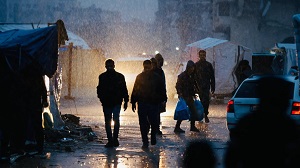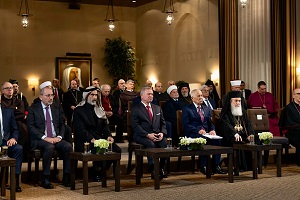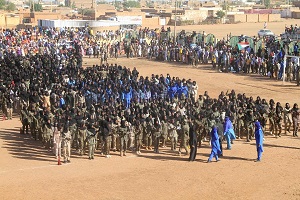Beware of Sick Maps - By Ghassan Charbel, Asharq Al-Awsat
The story of sick maps becomes painful when they choose to wait for a doctor from overseas and for treatment from distant laboratories. The patient’s desire to recover is fundamental to any treatment. Experience shows that states do not fall from the outside unless the inside is fragile and sick. The manifestation of a unifying national will is essential in this context. Perhaps, for this reason, any foreign tutorship is keen to break up the citizens’ unity and create confrontation lines between them. This is how old tensions are awakened, merged with new fears, to tear people apart and divide them on opposite barricades.
In our stricken region, we saw stark experiences and unexpected shocks. We saw the Iraqi army penetrate the Iranian borders during the era of Saddam Hussein. Then we saw Baghdad unable to form a government unless it obtained Tehran’s blessing. We witnessed Syria tightening its grip on Lebanon, moving strings and puppets, then we saw Lebanese militias crossing the borders to defend the Syrian regime. We looked at maps losing their immunity in front of the winds of disintegration or terror. We saw countries losing their stability and hiding in panic under a strong influence that haunted their voice and will.
There is much talk about an expected solution, not from Iraq, but from an American-Iranian deal. Most of the time, things are more complicated than many people think. For decades, Iran has exerted enormous efforts and launched various attacks to cut off the US thread that it believed was maintaining the stability and continuity of a number of countries in the region. In the past few years, the US administration launched a sanctions war to cut the Iranian thread that circumvented decision-making in several countries and transformed them into sick maps.
The Biden administration’s journey with the dire Middle East is still in its early beginnings. It is very important for the US administration to be able to read what has changed and what has been revealed, and not be merely an echo of old ideas capable not of treating sick maps, but rather producing more of them.
Stability has well-known pillars in the Middle East, and the Kingdom of Saudi Arabia is at the forefront of these foundations.
The Biden administration should reflect on the size of the change that Saudi Arabia has witnessed. This evolution has led to drying out the sources of extremism and opening the doors of hope for young generations that extremist ideology was previously trying to lure into terrorism. Relying on reports and assessments lacking evidence to make judgments or spread a climate of distrust with the allies will certainly negatively affect the stability of the region and the ability of the current administration to play a constructive role in it.
Sick Syria is not useful to anyone. Neither to its citizens nor to its neighbors. Neither to the region nor to the world. It certainly does not help putting this thorny part of the world we call the Middle East on the path to stability and prosperity. By sick Syria, I mean the country which is still dripping in blood as a result of the fierce wars that took place on its lands. I mean the country whose millions of people live in camps near their borders and do not dare or are not allowed to return. The country, whose official institutions do not control all of its territories, which today are scattered under many flags. The country, whose allies and enemies take part in making its decisions. In the past, Syria has been known for having a strong decision-making ability. It was not just an allegation, for Hafez al-Assad allowed neither Washington nor Moscow to dictate policies to him. Bashar al-Assad continued on this path before Syria’s role receded due to its withdrawal from Lebanon and the start of the cracking of its institutions with the outbreak of its “spring”, with all its justifications, circumstances, and horrors.
Sick Syria is not useful to anyone. It is certainly not beneficial to Lebanon, which is tied to its neighbor by veins that are impossible to cut. These arteries are definitely different from the illegal smuggling crossings that the “strong era” failed to control, making the latter the weakest of the tenures that Lebanon has ever seen.
The truth is that sick Syria, which is unable to regain its stability and restore its people, is a permanent project to destabilize the Lebanese arena and add fuel to the fire.
One does not need to be reminded of the geographical and historical links between Syria and Iraq which were evoked during the spread of the “ISIS state” over large parts of the territories of the two countries. If ailing Syria carries within it the danger of the birth of terrorism on its land or its infiltration into it, then it also carries the risk of being the scene of grinding battles or the outbreak of a war that transcends its borders.
The reality is that an Israeli war is being waged against Iranian targets in Syria, and Tehran has so far chosen not to respond in a way that could lead to a broad confrontation that Russia would not allow, even if the latter did not oppose Israeli local strikes against “Iranian positioning”.
Sick Iraq does neither serve its people nor the stability of the region, which is seeing increasing disintegration, poverty, and despair. What we have been witnessing for long is strange and is almost turning into accepted norms. Turkish warplanes launch raids on Kurdish targets inside Iraq, while the Turkish army establishes permanent bases inside Iraqi territory. On the other hand, Iran is tightening its grip on the Baghdad administration, or through factions that operate under direct orders from Tehran.
There is no exaggeration in the matter. Whoever follows the events realizes that Iraq is currently fighting a cruel battle to build its institutions and regain its sovereign decision in defense of its stability and interests. Baghdad’s current situation with Tehran reminds of Beirut’s past relation with Damascus… A relation that was based on artificial and exaggerated slogans, superiority, and terrorization.
The same can be said about Lebanon. A sick Lebanon does neither serve its people nor its neighbors. The same applies to Yemen.
The most dangerous thing that can happen is for past experiences to be repeated… That the fate of states be decided in the absence of their representatives, who are more aware of the aspirations and true interests of their peoples.
It would be extremely dangerous to give capitals in the Middle East the right to manage other countries, whatever the excuses. The tendency of peoples and groups to resist a trend of this kind will lead to the birth of forms of resistance, violence, despair, extremism, and terrorism. Succumbing to emerging powers and altering historical balances is awfully perilous.
The Biden administration should make a careful reading of the region and the pillars of stability and moderation there. Any sane observer has the right to say: “Beware of sick maps.” Wrong treatment worsens the infection.
Latest News
-
 US, Qatar, Turkey, Egypt meet in Miami to discuss Gaza truce on Friday
US, Qatar, Turkey, Egypt meet in Miami to discuss Gaza truce on Friday
-
 King receives Christian, Muslim religious leaders from Jerusalem, Jordan ahead of Christmas
King receives Christian, Muslim religious leaders from Jerusalem, Jordan ahead of Christmas
-
 Putin says Russia will 'certainly' achieve its goals in Ukraine
Putin says Russia will 'certainly' achieve its goals in Ukraine
-
 Sellami: Jordan target Arab Cup glory against ‘strong’ Moroccan side
Sellami: Jordan target Arab Cup glory against ‘strong’ Moroccan side
-
 RSF destroying evidence of atrocities in Sudan - report
RSF destroying evidence of atrocities in Sudan - report